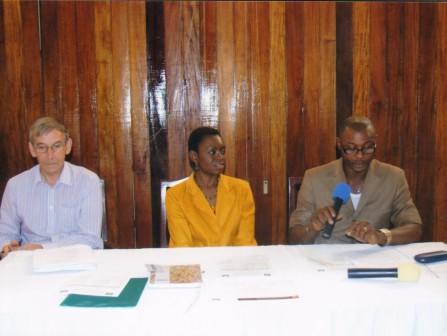BRIEFING NOTE – Enhanced Integrated Framework (EIF)
Capacity Development Workshop on Project Identification and Design, Freetown, Sierra Leone – March 11th – 14th, 2014
What is the purpose of this workshop?
The workshop aims to help build the participants capacity to design a results oriented project, using a series of practical analysis tools.
Over the course of the four day interactive sessions, participants representing diverse stakeholders will work in groups to actually design three “real” projects concerning commence and trade draft result frameworks will be elaborated into full proposals – under the coordination of the National Implementation Unit (NIU) of the Enhanced Integrated Framework (EIF) within the Ministry of Trade and Industry – that can be submitted to the CIF, or other donors, for funding.
The workshop is based on the notion that the success of a project is largely determined by the process used to design it. It emphasizes the importance of a participatory approach to project design, with input from a variety of key stakeholders in order to ensure that the project is relevant, feasible and takes into account the country context and local needs.
This tailor-made programme was specifically designed for EIF stakeholders. It is the result of a series of pilot workshops conducted by EIF’s Executive Secretariat (ES) and NIUs in Rwanda. Central African Republic, and Senegal, in partnership with the Center for International Development and Training (CIDT) of the University of Wolverhampton in the UK.
How will participants benefit from this workshop?
By the end of the workshop:
- Participants should feel more confident about applying Results–Based Management (RBM) concepts and tools, including the Logical Framework Approach (LFA), for project design.
- Participants should have a strong foundation for developing a full project proposal to attract donor funding.
- Participants will have gotten the opportunity to provide important inputs into the design of the “real” funding proposals, which should help ensure that the projects respond to actual needs and are feasible and appropriate to the country context.
What will be covered in the workshop program?
Some of the key topics to be covered include:
- Introduction to the project design and proposal development
- Stakeholder analysis and situation analysis
- The logical framework approach and setting objectives
- Identifying and managing risks
- Setting indicators and sources of verification
- Developing work plans and budgets (to a relatively limited extend)
The session will tackle the following types of questions:
- Who should be involved and consulted in project design, and how?
- What is the real problem the project is trying to tackle?
- What is the project trying to achieve in the long-term and what will it deliver in the short-term?
- How do we develop a good logical framework?
- How will we know if this project s successful or not?
- How do we plan for problems that might arise in the project lifetime?
- How can we “sell” the project to donors?
What approaches will be used in the workshop?
The workshop will be very ‘hands-on’ and active in nature. We will be working on a series of tasks in small teams. The approach will be interactive and participatory – a process of ‘learning by doing.’
In particular, the workshop will provide an opportunity for participants to become more familiar with the concept of Results-Based Management (RBM) and to use some key RMB tools in a hands-on way. RBM is a strategy to ensure that projects and programme contribute to the achievement of desired results (outputs, outcomes and impact). RBM requires:
- Clearly defined accountability for results
- Monitoring of progress towards results
- Reporting on performance
- Strong credible linkage between – the specific outcome achieved by a project and the resources used/activities taken place.
This workshop will take the participants through each step of formulating real projects, using the Logical Framework Approach (LFA). A Logical Framework or “Log Frame” is a management tool used to improve the design of project and programme intervention. It involves identifying strategic elements (inputs, outputs, outcomes and impact) and their causal relationships, indicators and the assumptions and risks that may influence success and failure. It thus facilitates planning execution and evaluation of a development intervention. It is a type of Results Framework or is sometimes called a Design and Monitoring Framework.
© 2014, https:. All rights reserved.




